 Worth a Thousand Words
Worth a Thousand Words
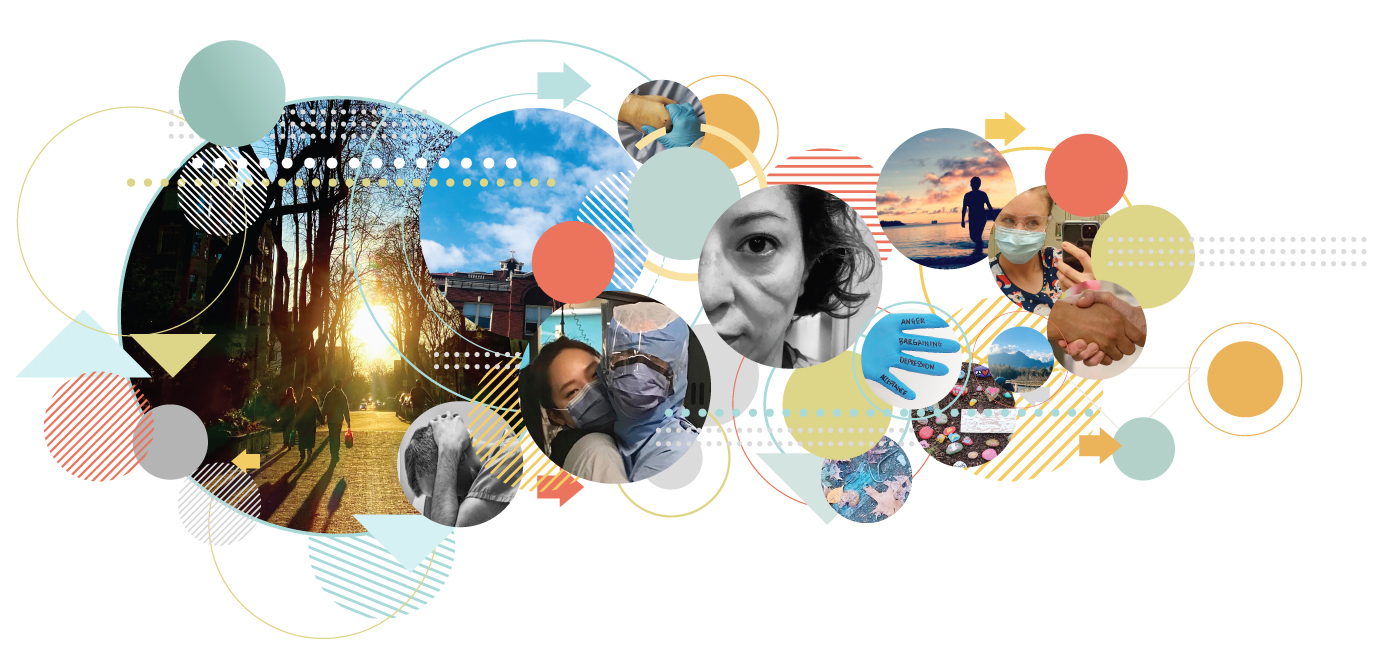
Researchers explore nurses' lived experience of the COVID-19 pandemic and give them voice through photography
"In the midst of every crisis lies great opportunity." Albert Einstein's famous quote has never been more apt than it is today as clinicians in health-care systems work tirelessly to protect their communities during the COVID-19 pandemic.
Nurses in Canada and around the world make up the largest number of health-care providers in the system, filling roles that are committed to the prevention and treatment of disease. There's no question that nurses have played a decisive role during the crisis, whether as direct care providers, educators, researchers or policy makers.
So, as we begin to emerge from the pandemic, it is essential that nurses' experience and expertise is used to shape health-care policy and develop strategies for future pandemic preparedness.
A group of BC nurse researchers has already begun this important work, and a study is now underway that provides nurses with an opportunity to discuss the occupational and social issues that have impacted their lives and their nursing practice during the pandemic.
The research team includes Douglas College instructors Ruhina Rana and Nicole Kozak, Providence Health Care Director of Research and Knowledge Translation, Agnes Black and student assistants Megan Scott and Lauren Wittal.
"The experiences and voices of the nurses participating in the study will be communicated to health-care leaders, educators and policy-makers, and hopefully used to strengthen health-care systems," Rana explains.
The team believes that the perspective of nurses and other point-of-care providers needs to be included in the development of policies and strategies related to pandemic preparedness.
Rana points to recent work conducted by Saudi Arabian and Australian researchers showing that nurses are well positioned to manage and prevent communicable diseases during a pandemic.
"It's a participatory action approach where the participant is seen as the expert."
"This research tells us that nurses have demonstrated their leadership capacity in a crisis and that they are ready to respond," says Rana, citing findings showing how nurses are "efficiently managing limited resources, instituting infection control measures and providing safe and effective care."
She argues that it's imperative for nurses' perspectives to be considered when planning the response to future health crises.
The BC study, which began in June 2020, is a collaboration between Douglas College and Providence Health Care. It uses a novel research method called photovoice, which employs photography, reflection and group discussion to help individuals share their experiences.
"Participants are seen as knowledge generators and contribute to the research by telling stories and sharing ideas, creating rich research data, offering critical reflection," explains Rana. "It's a participatory action approach where the participant is seen as the expert."
The data consists of photos and reflections submitted by participants, as well as the transcripts of online discussion sessions where participants interpreted and analyzed their photos.
The researchers were mentored by Douglas College instructor and researcher Dr. Colleen Reid.
"She's an expert in photovoice and has done a fantastic study looking at people in the community living with mental health challenges, where she gave them cameras to go out and photograph their experiences," states Rana.
The "voice" part of photovoice is especially important to the research.
"Nurses are ideally situated to provide feedback that represents the medical side and the patient side, and we liaise between them," says Rana when recalling the planning process.
"So, we just kept asking ourselves, 'where is nursing's voice in all of this?'"
When reflecting on nurses' voices, Rana says she also thought of the old adage "Why bother doing nursing notes? No one reads them." And the general feeling that what nurses write down and put out into the world is often ignored.
"We thought, 'what's a way to get nurses' voices out there that can't be ignored?' And so photographic images seemed like a really powerful way to put that message forward."
Rana also recalls the news coverage of the early stages of the pandemic, with the mass graves in New York and refrigerated morgue trucks, and was struck by the power of the images.
"Those things kind of came together and we thought, 'this is the way that we can get nurses' voices out there because peoples' attention is grabbed by these images and they don't look away,'" she says.
"We thought that photovoice, as an established methodology, would be a really strong way for us to influence the health-care system."
Data collection has now been completed and the researchers are in the process of analyzing all the information that has been gathered. The team plans to publish the findings later this year.
In the meantime, Update Magazine is publishing preliminary research in the following pages, which reflects some of the themes that have emerged so far.
The powerful images and narratives in the following pages reflect nurses' experiences in direct patient care during the COVID-19 pandemic. They will be shared with BCNU, researchers and health-care leaders to support nurses at the point of care and advocate for changes that will influence and improve patient care and the health-care system.
The opportunity has never been greater.
For more information on this research project please contact Ruhina Rana: ranar@douglascollege.ca
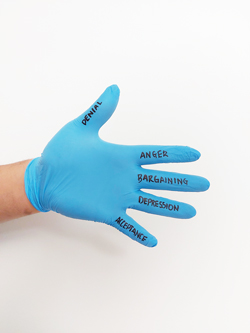
|
I have felt all five stages of grief throughout this pandemic. At first, I felt denial over how serious this was. Soon after, they declared COVID-19 as a worldwide pandemic. It all happened so fast. I started to get angry at those who wouldn't follow public health guidelines. I bargained with God. I felt anxious going into work, battling the unknown. My anxiety spiraled down to depression, it was so exhausting. It is only now that I've started to learn how to accept things. It's the new normal for most of us. |
| Overwhelming anxiety, fear of the unknown and the dangers front liners are putting themselves in each day. No one was prepared for this pandemic, so self care has become huge. It's been hard to stay away from our loved ones and our network who help us in our daily struggles. Since we can't hug and hand shake with friends, it's been really challenging to stay connected. |
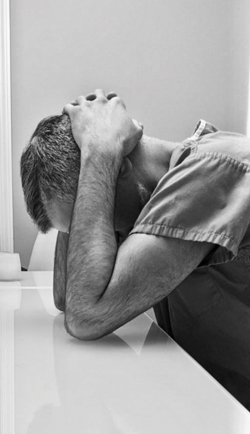
|
|
OCEAN BLISS Breathe it invites me into its waters and asks for my undivided attention Breathe It opens and offers its radiant healing powers Breathe I bow my head in respect and gratitude Breathe it beckons my presence and total submission Breathe it's temperature wraps me in, leaving me breathless Breathe a restorative pain that turns into warmth Breathe it both calms me and invigorates me Breathe its waves take what they need from me and then return what I seek Breathe until nothing else remains but absolute reverence Breathe |

|
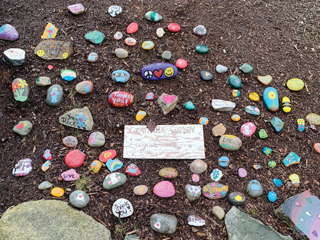
|
Community members placed a "Gratitude Garden" at the perimeter of the hospital. I walk by this garden and wonder if the rock painters ever imagined we would be so thick in the pandemic nearly one year later. Watching weather and time wear upon the rocks is a bittersweet reminder of how resilient we have all needed to be in this struggle. |
| Majority of patients' human connections were with gowned and masked strangers; a quick FaceTime chat with family; maybe a moment of physical touch with a gloved hand in moments when words can't provide comfort. These moments felt so clinical, yet this was the closest thing they had to physical affection. |
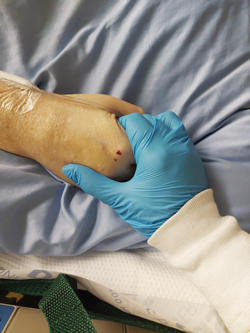
|
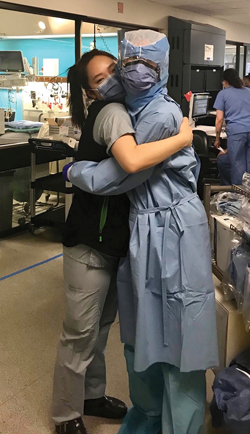
|
After I was suited up I gave my friend and co-worker a hug. I miss hugging my loved ones. In our ICU teamwork has always been important but my colleagues and I have gotten even better at it since COVID-19. We rely on each other to keep each other safe. |
| To wear or not wear a mask has become a political statement. It has become some sort of belief system. To some, this mask represents a hoax. A nuisance. A hindrance to personal freedom. I have tried to listen to the perspectives of those who believe that this whole pandemic is fake But I cannot convince them. Going to work feels like trying to put a fire out while some pour gasoline. And for that, I feel extremely helpless. "We are all in this together"... I only wish that this was true. |
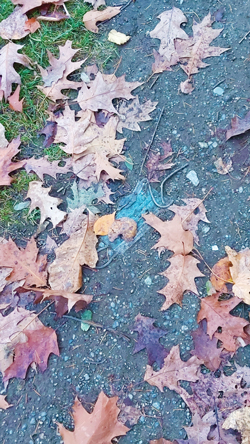
|
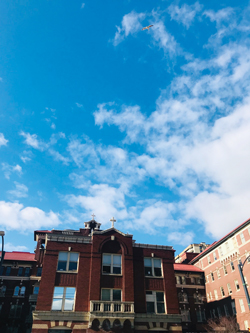
|
A peaceful-looking battlefield. |
| The positive energy that keeps me going. |
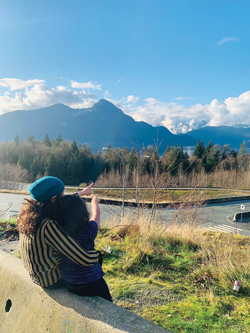
|
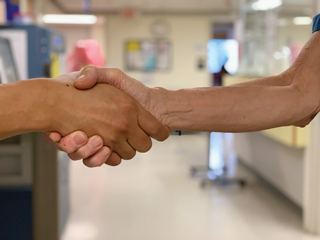
|
We have to watch and support each other in the frontlines. Without each other, our jobs and daily work will become even more difficult. |
| The photograph may only show the tracks on my face, but to me these tracks have a story to tell, a story that is only truly understood by those of us in the arena. The arena where we are fighting against this disease that has already taken too many lives, fighting to keep our patients alive, fighting against our own burnout and fighting against time. |
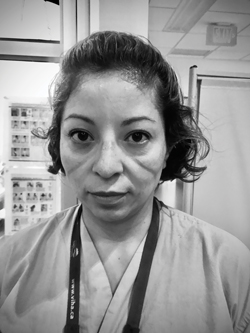
|
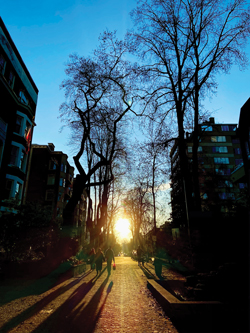
|
There is light at the end of the tunnel (COVID-19) |
| After the first COVID vaccination, it feels one step closer for things getting back to the way they were. In a pandemic that feels like eternity, nice to make a small but important step back to resuming our lives. • |
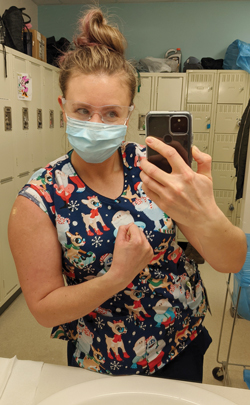
|
UPDATE (Spring 2021)

